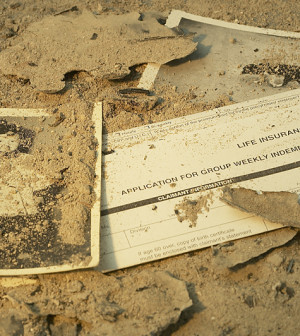- Could Your Grocery Store Meat Be Causing Recurring UTIs?
- Are You Making This Expensive Thermostat Error This Winter?
- Recognizing the Signs of Hypothyroidism
- 10 Strategies to Overcome Insomnia
- Could Artificial Sweeteners Be Aging the Brain Faster?
- Techniques for Soothing Your Nervous System
- Does the Water in Your House Smell Funny? Here’s Why
- Can a Daily Dose of Apple Cider Vinegar Actually Aid Weight Loss?
- 6 Health Beverages That Can Actually Spike Your Blood Sugar
- Treatment Options for Social Anxiety Disorder
Delays in Spotting Dementia Can Bring Dangers

A delay in diagnosing dementia can put people at risk, a new study suggests.
People who have signs of probable dementia but haven’t yet been formally diagnosed are nearly twice as likely as those who’ve been diagnosed to be performing potentially unsafe activities such as cooking, driving, and managing their medications and finances.
The study included information from more than 7,600 Americans. All were 65 or older.
The findings showed:
- About 17 percent of people diagnosed with dementia and 28 percent of undiagnosed people were still driving.
- Twelve percent of diagnosed people and 29 percent of undiagnosed people kept handling their finances.
- Seventeen percent of diagnosed people and 42 percent of undiagnosed people continued to cook meals for themselves.
- Nearly 22 percent of diagnosed people and 50 percent of undiagnosed people were still handling their own medications.
However, the study did find that people with dementia symptoms — whether undiagnosed or diagnosed with dementia — were less likely to engage in such activities overall.
“That in itself is good news, though the numbers are still important from a public health and safety standpoint. Either the patients themselves or their family members are self-regulating and doing these activities less frequently as their disease is progressing,” said study leader Dr. Halima Amjad.
Amjad is a fellow at the Johns Hopkins University School of Medicine’s Division of Geriatric Medicine and Gerontology, in Baltimore.
Patients and their families need to be aware of dementia so doctors and loved ones can take measures to protect patients, the researchers said.
“When patients receive a formal dementia diagnosis, their families are typically aware that, at some point, their loved ones will not be able to drive or will need more help with their medicine,” Amjad said in a university news release.
“But when people are undiagnosed, families and friends may ignore or be unaware of functional problems that already exist,” she added.
About 5 million people in the United States have some form of dementia, including Alzheimer’s disease. That number is expected to nearly triple by 2050, the researchers said.
The study findings were published online June 2 in the Journal of the American Geriatrics Society.
More information
The American Academy of Family Physicians has more on dementia.
Source: HealthDay
Copyright © 2026 HealthDay. All rights reserved.










